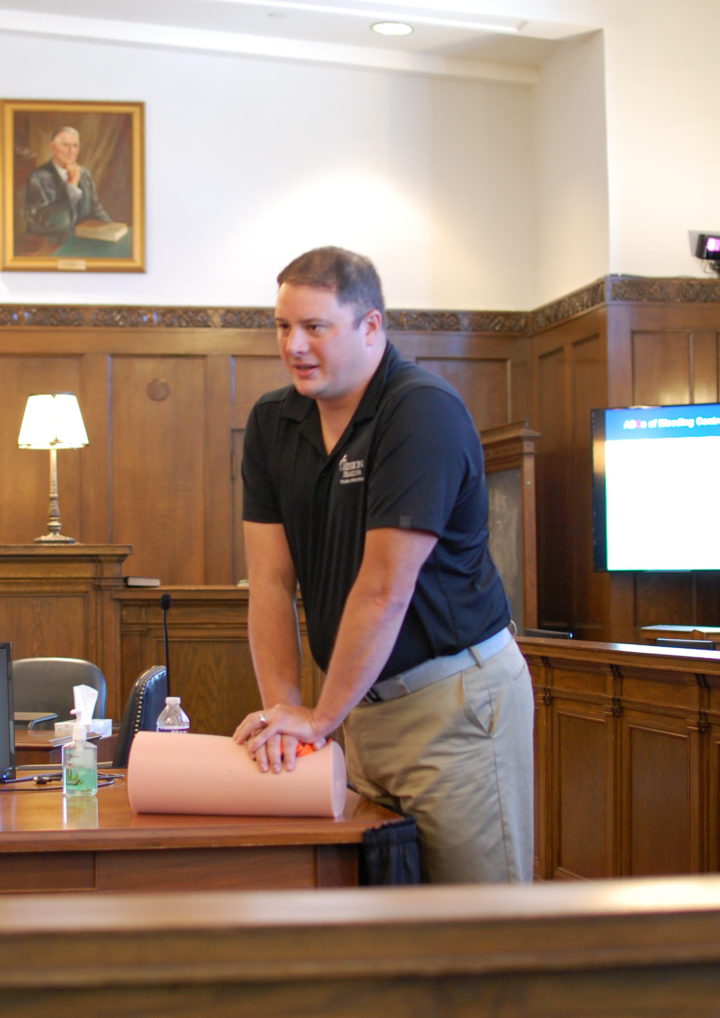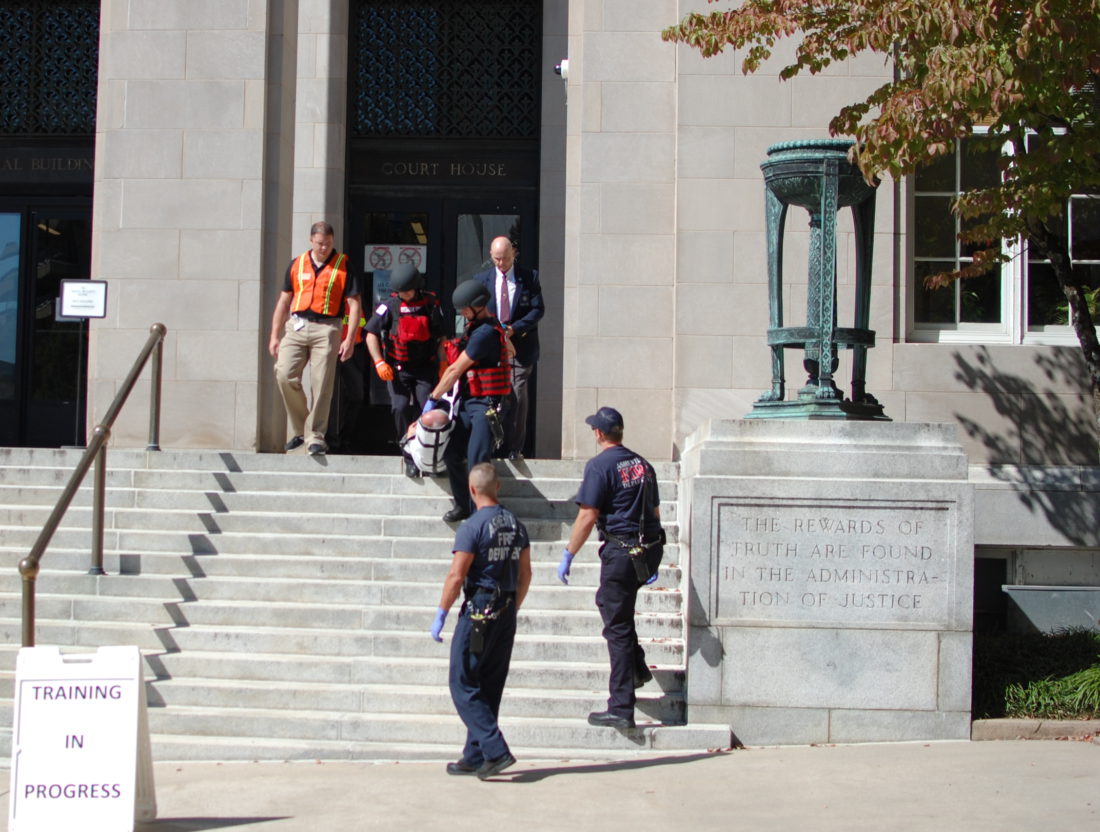Two villains entered the United States Courthouse on Otis Street in Asheville, shots ringing out as the assailants stormed the well-guarded facility and tried to reach an upper-floor courtroom. That was the training scenario U.S. marshals conducted Aug. 30 to prepare courthouse security staff for a terrifying yet unlikely possibility.
Training organizers said they intended the scenario to seem as real as possible, with marshals playing the assailants. Several simulated injuries, including gunshot wounds and a stab wound, added to the gravity of the situation. The exercise also incorporated response from local police, fire and medical personnel, including the emergency staff at Mission Hospital. Asheville Police Department officers escorted medical teams in body armor and helmets to carry and help the “wounded” out of the building for triage and treatment.
Observing the action unfold from across the street, events appeared to move both very fast and with agonizing slowness. The whole thing was over in less than an hour, but from the moment the first injuries happened, it seemed to take a lifetime to get medical attention to all those who were supposed to be in need.
After the dust settled and emergency workers cleared the scene, a second training commenced, put on for what marshals call “the courthouse family” — attorneys, clerks, administrative staff and the workforce that greases the wheels of justice on a daily basis. Participants from A-B Tech and Western Carolina University rounded out the group, which totaled about 65 participants in all.
Known as “Stop the Bleed,” the second training session was part of a wave of education taking place at schools and other area institutions. Designed to empower nonemergency service bystanders in emergencies, the session was conducted by Mission Trauma Services.
Stop the dying
A few months after the 2012 killing spree at Sandy Hook Elementary in Newtown, Conn., the American College of Surgeons convened concerned parties, including federal agencies, to develop policy recommendations aimed at improving the outcomes of events of mass violence and other tragedies. One important aspect of the group’s resulting plan, the Hartford Consensus, is to provide training in stopping blood loss. “So many people died from very simple wounds that easily could have been helped, had [victims and bystanders] been trained or known what to do,” says Tracey Gates, Mission Trauma Services’ outreach and injury prevention coordinator.
The training is meant to empower those who see a person in distress to do something about it, says Mark Shepherd, a critical care and trauma specialist at Mission, who led the training at the courthouse. While acknowledging that Stop the Bleed training originated as a response to active-shooter situations, Shepherd says the skills can be used in a variety of emergencies. “If you have an accident in the home, these are just good first-aid skills to have,” he says.
During the training, Shepherd told the story of a motorcycle accident victim. The person lost an arm and only survived long enough to reach Mission thanks to the presence of a bystander with first-aid skills for blood loss.
Gates recalls several such situations in which trained people on the scene allowed Mission to do more for the victims. “We’ve had some amazing heroes that have saved the lives of some patients that have come through our trauma program,” she says. “It’s so exciting when we see the message being carried out by these wonderful heroes that are just minding their own business, driving down the road, and then they’re willing to stop and help.”
Start the teaching

According to Gates, Mission conducted some Stop the Bleed trainings in 2017, but the program really began to gather steam last year. Trauma department leadership decided to step up area training in trauma injury prevention in accordance with the Hartford Consensus. “[They] kind of just spun me around and pushed me out the door, and the word just got out, by word-of-mouth mostly, that we were doing this,” says Gates.
In 2018, Transylvania County Schools received a grant from the N.C. General Assembly for a pilot program to train teachers in Stop the Bleed techniques and to stock classrooms with bleeding control kits. That October and November, Gates’ team trained around 700 system staff members.
Funded by Great Smokies Health Foundation, a similar program took off in Jackson, Swain and Graham counties. Michele Garashi-Ellick, the foundation’s executive director, says her organization learned about the initiative from an emergency worker with Harris Regional Hospital in Sylva. Gates and her associates led some of the training, which reached 700 teachers and administrators. The foundation also provided 900 emergency bleeding kits for classrooms, buses and other places where students gather.
According to the Hartford Consensus, Stop the Bleed is designed to have a ripple effect, and that’s what happened in the case of the GSHF initiative. Gates and Shepherd conducted train-the-trainer seminars for people with medical backgrounds like nurses, EMS workers, first responders and law enforcement, who then conducted trainings for the school systems.
Gates says Mission plans to provide training to all the schools in Buncombe and neighboring counties. From the end of this month through May, Mission Trauma Services will train every teacher in Buncombe County Schools; after that, Asheville City Schools will be next, Gates says. State legislation passed in 2019 provides nearly $70 million over the next two years to fund safety equipment, including classroom bleeding control kits, as well as training and increased staffing levels for school resource officers and mental health professionals.
The Mission team aims to offer training sessions two to three times per week. Since launching the effort in 2017, the team has trained over 4,000 people, according to Gates.
Motive for medicine
Mission may be the 400-pound gorilla of health care in the region, but other local organizations also provide training in bleeding control. Dave Pike, a former EMS worker, recently offered a training at the Anarchist Book Fair at Kairos West. He works through Appalachian Medical Solidarity, a community organization that provides medical training and support to vulnerable populations and those who are challenging the status quo.
Providing medical treatment knowledge at no cost, Pike says, breaks down some of the hierarchy our society has developed around health care services. He also hopes to equip activists with skills to respond to situations such as the 2017 Charlottesville Unite the Right rally, in which those protesting the event had violent interactions with rally participants. His training also addresses how to deal with tear gas and Tasers.
Pike offers advice for bystanders who encounter a life-threatening injury: “People need to stay calm. … Realize that blood [triggers] a natural instinct for us to freak out a little.” With a little knowledge and the ability to stay cognizant of the situation, he says, most people can be effective in an emergency. Most bleeds can be stopped with pressure alone. “You just have to get direct and apply more force,” he advises.
Meanwhile, area gun shops have also offered first-aid classes, citing perceived leftist threats as a reason to be prepared for combat situations, including emergency medical treatment. When contacted for comment, however, one trainer said the class he offered did not happen because too few people signed up. Gates says her training has also been requested by a gun range, among other private businesses.
Gates says the Sandy Hook roots of Stop the Bleed programming are the impetus for prioritizing schools. But her team will basically provide this training to anyone who asks, free of charge. Whether it’s for public health or for participation in protest activities, medical trainers say they hope to empower people to intervene effectively when they might otherwise feel helpless. “The basis of this program,” says Gates, “is to have people out in the community that are trained so when there’s something that happens at a park or a mall or a child falls off a jungle gym, there’s someone there that knows the basics of stopping the bleed.”



Great news! Thank you!